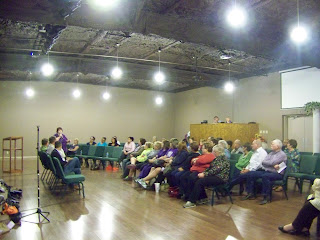"Telling Amy's Story" goes through the timeline of the relationship of Amy and Vincent to show the progression of violence throughout their relationship. Their relationship spanned 4 years and had police, family, and friend involement. The day that Amy went to leave Vincent, gather her things and her two small boys belongings...she was shot once inside her home. Her family and children were in the car when Vincent came out to announce "Someone call 911. I just shot Amy". Amy Homan McGee was 33.
The Haven hosted the viewing at Brady Community Church. We were so blessed to have roughly 60 people come to our event and watch the documentary. After the viewing, we had a panel of members from the Brady community to answer questions on how anybody can help prevent domestic violence and sexual assault here in our hometown. The panelists were Captain Matt Andrews, County Attorney Mark Marshall, County Judge Danny Neal, and Volunteer Coordinator/Community Educator Corrie Andrews. Each member of the panel answered questions from the audience as well as designated questions to give further information on what The Haven is doing to put prevention plans in place as well as how a domestic violence case is handled through all aspects of the legal systems.
There was also a special silent auction in which all the proceeds went directly to The Haven for client services. We want to thank the community and our Board of Directors for donating some amazing items! We really had a wonderful auctions thanks to their generosity.
For our event, The Haven was lucky enough to have a mediator for the discussion from the Texas Council on Family Violence (TCFV). April Buentello began working with victims and survivors of domestic violence and sexual assault while attending St. Edward’s University, Austin Texas in 2001, Through the psychology program, Buentello trained as a volunteer with the Travis County Domestic Violence Center in Austin, TX (SafePlace). The experience through SafePlace led her empowerment based advocacy work during her internship and later employment at the center. During the 5 years at the Travis County domestic violence program. Buentello served as a Crisis Intervention Specialist, Family Advocate, Latino Community Resource Advocate and Counseling Intake Specialist. Buentello was an active member of the Texas Assosciation Against Sexual Assault Diversity Task Force, Austin Police Department Task Force on the “Basta Ya” campaign and the Health and Human Services Immigration Task Force. Buentello also worked with American Youthworks, Austin Texas providing at-risk youth an opportunity to transform their lives through education, service and job training. She know works for TCFV.
Here are some pictures from the event:.
The Haven wants to thank everyone for their support and attendance for the showing of "Telling Amy's Story". We hope to be having a similar event each year to celebrate the lives of the victims through our prevention work.
There was also a special silent auction in which all the proceeds went directly to The Haven for client services. We want to thank the community and our Board of Directors for donating some amazing items! We really had a wonderful auctions thanks to their generosity.
For our event, The Haven was lucky enough to have a mediator for the discussion from the Texas Council on Family Violence (TCFV). April Buentello began working with victims and survivors of domestic violence and sexual assault while attending St. Edward’s University, Austin Texas in 2001, Through the psychology program, Buentello trained as a volunteer with the Travis County Domestic Violence Center in Austin, TX (SafePlace). The experience through SafePlace led her empowerment based advocacy work during her internship and later employment at the center. During the 5 years at the Travis County domestic violence program. Buentello served as a Crisis Intervention Specialist, Family Advocate, Latino Community Resource Advocate and Counseling Intake Specialist. Buentello was an active member of the Texas Assosciation Against Sexual Assault Diversity Task Force, Austin Police Department Task Force on the “Basta Ya” campaign and the Health and Human Services Immigration Task Force. Buentello also worked with American Youthworks, Austin Texas providing at-risk youth an opportunity to transform their lives through education, service and job training. She know works for TCFV.
Here are some pictures from the event:.
Lance and Corrie Andrews
Donna Jones and April Buentello from TCFV
Our Panel: Mark Marshall, Matt Andrews, Corrie Andrews, & Judge Danny Neal
Wonderful turn out!
The Haven wants to thank everyone for their support and attendance for the showing of "Telling Amy's Story". We hope to be having a similar event each year to celebrate the lives of the victims through our prevention work.





